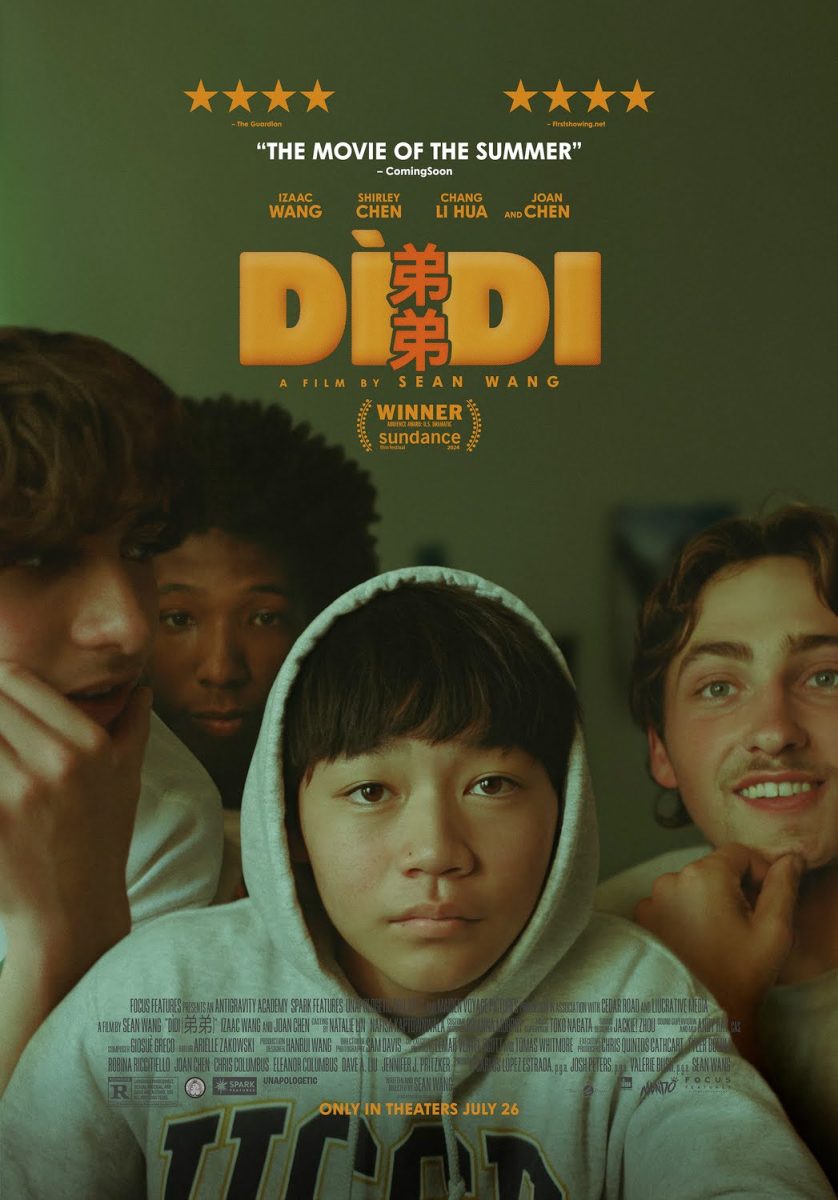What does it feel like to be an outsider in a place you think you should belong to, where everyone looks like you? Sean Wang, a 30-year-old Taiwanese American filmmaker hailing from Fremont, California, dove into the unique experiences of his childhood that sparked this question in his first feature-length directorial debut, “Dìdi.” After winning the U.S. Dramatic Audience Award and Special Jury Prize for Best Ensemble Cast in 2024 at the Sundance Film Festival, the coming-of-age film hit all theaters on Aug. 16.
ECHOES OF A SUMMER PAST
Set in the summer of 2008, in Wang’s hometown of Fremont, we follow along through the life of 13-year-old Chris Wang — or Wang Wang as his friends call him — as he navigates middle school and the desire to feel seen. We’re invited into Chris’ childhood home, where he lives with his mother, sister and grandma. Here, you’ll hear family members calling Chris “Dìdi,” which means “little brother” in Mandarin.
The director sets the scene of Dìdi’s family dynamic from the start of the film, where we find him and his sister, Vivian, arguing at the dinner table. This leads their grandmother to scold Chris’ mom about how she’s raising her children, expressing her frustration over the absence of her son, Chris’ father, who works in Taiwan to provide for the family. This is a striking scene to be thrown into after initially being bathed in the sunlight that streamed through Chris’ childhood home in the opening scene, before quickly shifting to a dimmer, more tense setting that highlights the family’s conflicts and the underlying cultural dynamics at play.
In an interview with Filmmaker Magazine, director Sean Wang explains his choice to dive into these conflicts within the narrative, this being his first aside from his signature documentary style in his past work.
“In regard to themes of family and my own family, so much of making something good is forcing yourself to be vulnerable and allowing yourself to ‘go there’ and ask the hard questions, question yourself and question why things are the way things are,” Wang said.
Throughout the film, Chris uses early 2000s AOL Instant Messenger (AIM) to ping his friends and check their statuses on MySpace and Facebook. The storyline authentically captures the early-internet era of 2008, along with the raw emotions of teenage angst, while still managing to be cinematically captivating and culturally genuine. It’s a factor that adds comfortable layers of nostalgia, while successfully balancing the struggle to not overwhelm the powerful narrative with too many trips to the past.
THE FABRIC OF FAMILY
From the start of the story, Chris pushes away those who want to protect him most, taking out his anger on his older sister and mother and saying things that can’t be taken back. As Chris’ older sister prepares to go away to college, Chris wrestles with his uncertainties of growing up. His mother, Chungsing, always welcomes him back with her calm, forgiving nature after dramatic fights – conflicts that, upon reflection, echo a common fear of growing up and grappling with the uncertainties life holds for all of us.
As the story unfolds, it becomes clear that Chungsing is the only person who truly sees him for who he is, leaving viewers to wonder if the film is a love letter to director Wang’s mother. Despite the love Chungsing shows for Chris throughout the plot, he repeatedly tries to conceal his cultural identity in an effort to fit in, muttering “so Asian” under his breath as his mother neatly eats her hamburger with a fork and knife in one scene. Chris’ struggle with feeling different reflects the isolation many bicultural audience members echoed through their own journeys toward self-acceptance. These scenes leave a bittersweet taste, as we witness heartbreaking moments where Chris is unable to find peace within himself. Yet, they also create space for the audience to connect with him, reflect on our own “canon events” and recognize that he is still in the process of growing up.
BETWEEN TWO WORLDS
Chris tells his new skater friends that he is only half-Asian, a claim that gets awkwardly debunked and leaves Chungsing confused. After several experiences that make Chris feel he’ll never live up to his family’s expectations, he asks his mother if she’s ashamed of him in a scene that brought the whole theater to a silence. In a heartfelt monologue, we arrive at the root of Chungsing’s high expectations and hopes for Chris, where she shares that she left behind her dreams of becoming a famous artist in New York after immigrating, to take care of her new dream: her children.
These moments give the film a genuine, lived-in feeling that’s often missing from other coming-of-age flicks. They capture the intense pressure Chris feels to avoid disappointing his family, brought to life by the impressive performances of teen actors, many of whom appeared on screen for the first time. These elements not only heighten the emotional impact of the narrative, but also invite the audience to reflect on their own dreams, fears and the pressures they’ve faced along the way.
“Dìdi” not only dives deep into the immigrant experience in impressively raw performances, but also delivers a powerful message about the importance of love while navigating growing pains. The film flawlessly balances emotional depth with moments of lighthearted humor, allowing us to truly connect with Chris’ journey. By the end, we see Chris truly acknowledge his mother for the first time, realizing just how profound her love for him.
Through Chris’ journey, “Dìdi” teaches us that true belonging isn’t just about fitting in, but about the beauty of being seen and accepted by those who love us unconditionally. This love adds an extra layer of heart to the story, leaving a lasting impression that resonates long after the credits roll.






